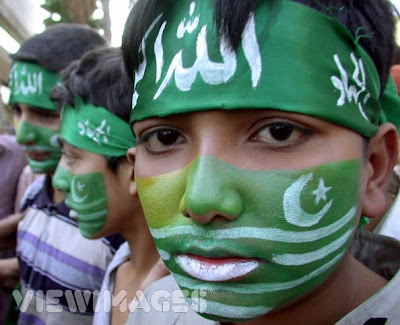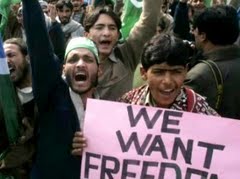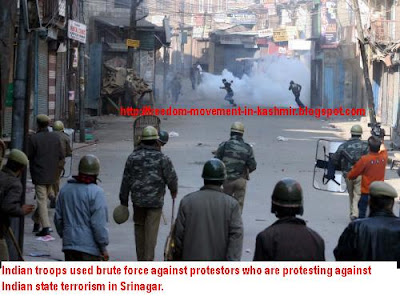A bold initiative from ToI. The full page opinion peice / article appeared on Sunday 13-June-2010.
Fighter
UNDER SEIGE
In Iraq, there is 1 soldier for every 166 people. In Kashmir, there is 1 for every 20
July will mark 20 years of the controversial Armed Forces Special Powers Act in J&K. The people are angry the Army is still there. Is it time to start pulling out?
Rajat Pandit | TNN
No Army likes to wage war against its own people. Worse, if the fight drags on 20 years. The 1.13-million strong Indian Army is no exception. It would jump at the chance to leave the Valley and return to barracks, but only if policy-makers delivered their end of the bargain. Is the time right for this? Militancy in Jammu and Kashmir is at its lowest ebb since it erupted in 1989-1990. But there are two hurdles. First, will Pakistan’s real power centre, its army, turn off the terror tap? Second, can the paramilitary forces and J&K police take over from the Army? On both counts, the answer seems to be ‘no’.
“We are trapped in the ‘hold’ part of the ‘shape, clear, hold and build’ strategy,” says a lieutenant-general, with extensive experience in J&K, speaking on condition of anonymity. He adds gloomily, “We will be stuck there for the foreseeable future. With so much money being pumped in, vested interests have developed all around. A political solution, with economic development, is needed.”
http://img23.imageshack.us/i/mapij.jpg/
It has been an arduous task for the Army to ‘shape, clear and hold’ the internal security environment in J&K. Protracted counter-insurgency operations in J&K and the North-East have blunted its operational readiness for external enemies” and corroded its discipline and moral fabric. Last week’s suspension of a major and the removal of a colonel from command for an alleged fake encounter on April 30 is just the latest example of this. The Army has slowly moved away from using “kills” as the benchmark for evaluating a battalion’s performance for awards and citations, but the pressure to deliver results remains.
Consider cold statistics. More than 1,500 cases of human rights violations have been filed against the Army in the last two decades. Granted that a majority of them — the Army puts the figure at 97% — were found to be “fake or motivated” but what of the rest? The Army takes recourse to the iron-fisted Armed Forces Special Powers Act (AFSPA) to refuse to hand the accused to civilian authorities. It says it has its own “internal mechanisms” to deal with “aberrations” under the Army Act, 1950.
“We have punished 104 personnel, including 40 officers, in the cases found true. We have made human rights a top-priority in last five-six years. But we cannot allow soldiers battling terrorists, which cannot be equated with normal law and order duties, to get no legal protection and be left to civilian courts in the event of something going wrong. It will hit troop morale,” says a senior officer.
General V K Singh, who took over as Army chief in April, has declared that “any dilution” in AFSPA will “impinge adversely on the manner in which armed forces operate” in counter-insurgency duties. Consequently, the Centre consistently refuses to give permission to the J&K government to prosecute soldiers accused of human rights violations. During 2007-2009, there were 23 such requests but the ministry of defence did not permit any one of them to go ahead.
This does not, of course, detract from the Army’s success in controlling militancy in J&K. Militancy is not quite dead. Pakistan may be acting against the Taliban on account of US pressure but it has let the anti-India terror factory remain active. There are at least 32 terrorist training camps, with an estimated 2,200 militants, operational in Pakistan and ***. Unsurprisingly, the Army contends no one should rush to assume all is well in J&K.
According to estimates, there are just about 500-600 hardcore terrorists — half of them of “foreign origin” — in J&K at present. They still pose a threat, but it is marked reduction on the numbers — more than 2,500 — bandied about in the 1990s.
“With the CRPF (which has around 70,000 troops in J&K) and police forces still not really trained or equipped for the swift operations required, coupled with their poor leadership, any largescale de-induction of Army troops will only weaken the counter-insurgency grid,” says a Rashtriya Rifles officer. “Whenever the Army has been removed from an area the militants and their over-ground workers begin to dominate there.”
Defence minister A K Antony also believes that the terrorist threat remains very real. “The quantum of troops deployed in J&K is continuously assessed and reviewed by the Army based on the changing threat perception,” he says. The Army has moved two mountain divisions of around 35,000 men from the state in the last few years but further reduction can only happen when conflict management turns to conflict resolution.
Life in the shadow of gun
M Saleem Pandit | TNN
Srinagar: Till 1990, there were few guns in the Valley. But, soon enough, the situation changed. As the Kalashnikovs began to dominate the streets, Kashmir was flooded with uniformed men. In the last 20 years, a generation of Kashmiris has grown up with soldiers at every street corner; often, even in their living rooms. There are too many troops in Kashmir. There have been too many clashes between men with automatics and youth with stones. Many Kashmiris see the Army as one “of occupation”.
Human rights activist Khurram Parvez says the police records 458 cases of pending civilian killings and rapes between 1990 and 2007 because the men in uniform cannot be prosecuted. “We want transparent and independent investigations into many encounters that took place in April-May 2010,” he says.
Arshad Anderabi has spent 14 years fighting for justice for his dead brother Jaleel, a lawyer and prominent human rights activist. He alleges that Jaleel “was abducted by the major (Avtar Singh of the 103rd unit of the Territorial Army) on the airport road when he was driving home along with his wife. He was killed in cold blood and his body was dumped in the Jhelum”. The special investigation team that investigated Jaleel’s death found Major Singh responsible for the murder. But the major is now reportedly living in California and Jaleel’s family still waits for justice.
Though the Indian army has been in the Valley since 1948, its presence was never as visible as after militancy began. K B Jandial, retired IAS officer and now a member of the state public service commission, says, “The army must put in place a system of checks and balances and rein in the troops who take the law into their own hands. This has diluted the forces’ achievement of almost destroying terrorism. Irresponsible actions of low rung-officers will harm India’s credentials as a democratic and secular nation.”
There seem to be far too many Kashmiris who believe the Indian army is a ruthless force. Javid Iqbal, a respected doctor, says there is a huge trust deficit between the people and the army. “During the second world war, Churchill would often say ‘Indian Army any day’. That was a real tribute to the discipline and combat effectiveness of the forces. However, I wonder whether this attribute still holds for the army given the recent complaints of human rights violation.”
The police says that there have been 51 allegations of rape against Indian army men in the last six years. Such allegations are deeply damaging to the army’s image. In 1991, about 100 women, including minors, the elderly, pregnant and disabled, were allegedly raped by a 4th Rajputana Rifles unit in Kunan Poshpora, Kupwara. “I am afraid that army could never restore its image in Kashmir given their behaviour with civilians here,” says Qurat-ul-Ain, a social activist.
Of late, the army has been working on damage control through its humanitarian work. Colonel J S Brar, the defence spokesman here, says the Army is trying to win hearts and minds. “Under our Sadbavana programme, we are trying to alleviate, medicate, rejuvenate and ultimately uplift the quality of life of civilian population ,” he says. But considering the quantum of allegations against the army, many of the locals would regard this as too little and too late.
LAST WORD
An Act that defies the law?
Josy Joseph | TNN
Contrary to popular belief, India does not have an impressive record of ending insurgency. One result of this messy reality is that the draconian Armed Forces Special Powers Act (AFSPA) exists in several parts of the country. It gives legal permission to the military to arrest or conduct a midnight search without a warrant on the basis of reasonable suspicion.
Most statistical studies show that civil wars in the last century lasted a little over seven years on average. The shortest may have run for just a few days; the longest more than 30 years, according to trends in recent World Bank-funded studies. These findings were mostly based on the African experience, but the global measure of insurgencies isn’t very different. Civil wars that began before 1980 lasted 78 months or thereabouts, but those that started after 1980 had a longer lifespan of roughly 105 months. What of India’s record? It has been disturbingly poor. The Naga issue has been festering from before Independence, Kashmir since 1987, Manipur is on fire yet again and Assam hasn’t really been at peace for three decades. And Naxalism has risen from the ashes, with its deadly challenge to the state, unleashing a violence that devours more than a hundred lives a month.
Punjab and Mizoram are the most prominent of India’s few successes in ending insurgency. But they are the exceptions.
Even though the security forces, especially the military, have shown impressive ability in containing insurgency, the political leadership generally lets the status quo prevail rather than transforming the containment into permanent peace. This lack of political capability is now forcing the army to resist major troop reduction in Kashmir, despite a drop in violence. The Union home ministry had suggested the army move some of its Rashtriya Rifles battalions from J&K to Naxaliteridden areas, but the Army, as a senior officer explains, has “contained the violence in Kashmir, and our security grid is working very effectively. What guarantee is there that permanent peace would be achieved in Kashmir, and that we won’t need to go back to manage a messed up situation?”
Many within the security establishment believe New Delhi has failed to grasp the opportunity to create a lasting peace in Kashmir. As a result, the people of J&K are soon to complete two decades under AFSPA’s menacing shadow. In Nagaland, the act has been in existence since 1958, when it was first enacted by Parliament to contain Naga dissidence. It exists in the entire state of Assam since 1980, in all of Manipur outside Imphal municipal limits, in the hill districts of Tripura, in Arunachal Pradesh’s Tirap and Changlang districts and in a 20-km belt bordering Assam, and along another 20-KM belt of Meghalaya bordering Assam.
Army officers insist that the legal protection offered by AFSPA is crucial to their success and is a prerequisite for anti-Naxal operational deployment. “It is necessary not to treat soldiers as mere policemen. The legal protection empowers them to act with far better determination. The results are there to be seen,” says a senior army officer.
Imposition of AFSPA is invariably accompanied by a huge surge of military and paramilitary forces. Both reflect the state’s determination to facilitate the military containment of insurgency. Estimates vary, but the army’s Jammu-based 16 corps was, at one time, bigger than the British army. This, despite there being two other corps in the state as well. There are no specific numbers available, but around 5,00,000 security personnel are believed to be deployed in J&K, which has a population of just over one crore. That is a skewed security personnel to civilian population ratio and it gets worse in the Kashmir Valley.
But the Indian state’s inability to grab the admittedly slim opportunities for peace is not limited to J&K. Forgotten battles are raging across the northeast. As a result, generations have grown up with a distorted sense of liberty and democracy in several states. To them, India is an illiberal democracy, defined by the military man’s right to open fire on crowds, search houses and individuals and control people’s daily lives using the authority that comes from the law of the land, aka the Armed Forces Special Powers Act.
Women can win the war on war
Madhu Kishwar
Amid reports that the Americans are using female marines in Afghanistan to gain access to local women and thereby swing the population to their side, there are suggestions that India could do the same in Kashmir. But, recruiting a few women to control human rights abuses in Kashmir would be like applying band-aid to a deeply-infected wound. Kashmir requires a political solution, not a military one. Band-aid solutions evoke disdain rather than inspire confidence.
Human rights are violated when those in positions of power feel they can get away with murder. The Indian Army is highly professional. However, by enacting draconian laws such as the Armed Forces Special Powers Act that give blanket immunity, their professionalism is compromised. They lead to fake encounter killings as a means to career advancement. In such a situation putting a few women soldiers on the streets is not likely to win over many hearts in Kashmir.
The image and conduct of our police has not improved with the recruitment of a handful of women because the overall mandate of the police as an institution is firmly set in the colonial mould. The culture of these organizations places a premium on macho qualities. Women are numerically insignificant and far removed from leadership positions. Therefore, instead of feminizing the culture of these institutions, women tend to emulate men as a survival strategy. Many women who work in the forces in junior positions have experienced sexual abuse and harassment without effective redress. Those who are unable to defend their own dignity are not likely to be able to sensitize the overall orientation of the Army.
However old fashioned it may sound, I still firmly believe in Mahatma Gandhi’s vision that in the war against war women must lead — they must teach the art of peace to a warring world. Gandhi’s success lay in convincing large sections of India that societies become civilized only when men imbibe some of positive feminine qualities, such as nurturing and revulsion towards violence.
At present, the Army is overstretched and fatigued as it battles the civilian population for whom the presence of the armed forces is itself an annoying reminder of their “subjugation”. Our officers are becoming increasingly resentful at being made to pay for the follies and mischief of politicians. Their role must be limited to defending the borders and ensuring that terrorists from neighbouring countries don’t sneak into India.
Knowledgeable people within the government admit that, as in Punjab, the terrorist threat in Kashmir can be best countered by a well-trained, highly-motivated, self-respecting and accountable J&K police. This can happen only if the police are freed from political interference. The Centre should join hands with the state government and use J&K as a laboratory for far-reaching police reforms. If 35 to 40% of this reformed police service comprised women, their presence would further humanize the law and order machinery. When the citizens of the state feel they are trusted and responsible for maintaining internal security, they are bound to rise to the occasion because they have the highest stake in peace.
Kashmiri society has been brutalized due to the devious games of successive political leaders in legitimizing the gun culture. However, when in 2002 Mufti Mohammad Sayeed emerged in his new PDP avatar with the slogan: “Na bandook se, na goli se, Baat banegi boli se”, Kashmiris, young and old, responded with enthusiasm. This is evident in the dramatic rise in voter turnout since PDP joined the electoral fray. The romance with the Pakistani militants’ gun is all but over. The Kashmir problem requires that the Central Government also act with the conviction that na banddok se na goli se, baat banegi boli se.
Cosmetic changes to the Army’s image cannot be a substitute for determined efforts to find a political solution acceptable to diverse sections of Kashmiri society. People will have faith in “boli” only when it is backed by a responsive polity and a government that has the ability to deliver what it promises.
Madhu Kishwar is editor of Manushi


 ,even guru accepted wat he had done.and this old guy is saying he is innocent.a lot of times video is shown on tv ,in which he is accepting the role.
,even guru accepted wat he had done.and this old guy is saying he is innocent.a lot of times video is shown on tv ,in which he is accepting the role.















